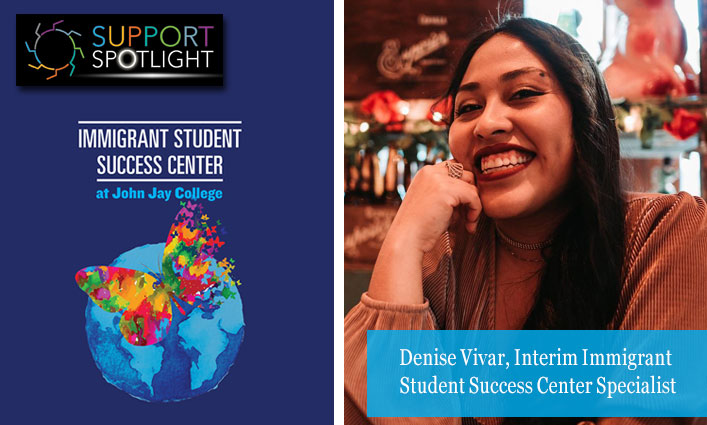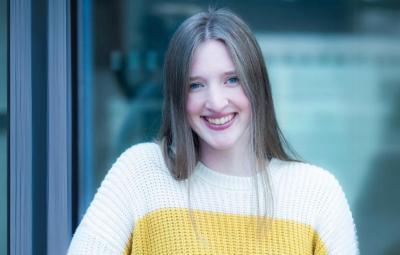
“The Immigrant Student Success Center provides a wide range of resources to help all students regardless of their immigration status.” —Denise Vivar
John Jay’s Immigrant Student Success Center (ImSSC) is committed to uplifting and empowering all immigrant students and their families. The Center, the first of its kind in the City University of New York (CUNY) system, provides students with access to mental health counseling, financial support, and legal assistance. “We are here to help you, regardless of your immigration status,” says Denise Vivar, Interim Immigrant Student Success Center Specialist. “We offer legal screenings, DACA renewals, emergency funds, and postgraduate opportunities. There are many challenges that our undocumented and immigrant students face. Our goal is to help our students build a community and support them in any way we can.” We sat down with Vivar to learn more about the Center, and how it’s providing a safe space for students to access the resources they need to succeed, develop emotional well-being, find a sense of community and belonging, and feel empowered.

Who does the Immigrant Student Success Center serve?
The Immigrant Student Success Center provides a wide range of resources to help all students regardless of their immigration status. At the Immigrant Student Success Center, we can connect students and their family members to legal service providers that will be able to assist them with any questions they have. During the summer, I received a lot of requests from students about their mixed-status family members asking if they qualified for certain programs. A lot of those requests concerned housing because people were struggling to pay their rent. Students were looking for information for their aunts and uncles, their parents, or their siblings on what housing resources were available to them regardless of their status. We’re not just providing assistance to John Jay students; we also care about the well-being of our students’ families.
“If you are a Deferred Action for Childhood Arrivals (DACA) student and you need to renew your work permit, we are able to connect you to a pro-bono lawyer to help you with the renewal process.” —Denise Vivar
What are some important services provided to our students?
If you are a Deferred Action for Childhood Arrivals (DACA) student and you need to renew your work permit, we are able to connect you to a pro-bono lawyer to help you with the renewal process. Not only do we help DACA students set up appointments with those legal providers, but we also cover the $495 application fee for students who reach out and need that support. Also, we work with students who are in the process of adjusting their status and connecting them to a lawyer to complete a citizenship application. The Center sends out a weekly newsletter during the spring and fall semesters, monthly in the summer, that includes information on events, scholarships, internships, and job opportunities that are available to students. We encourage students to sign up.
“With the help of legal experts, students can figure out if there is a form of immigration relief that they qualify for and what their options are.” —Denise Vivar
What are legal screenings and how can they help undocumented and mixed-status families?
The path to citizenship is not always linear. The Immigrant Student Success Center has partnered with the New York Law School and Volunteers of Legal Services to provide students with legal experts. These legal screenings are monthly and run between 30 to 45 minutes. With the help of legal experts, students can figure out if there is a form of immigration relief that they qualify for and what their options are. John Jay students that have participated in the legal screenings have identified that they qualified for something called Special Immigrant Juvenile Status. There is a deadline to apply, so students need to reach out. For students who qualify, immigration relief can be a pathway to citizenship. This information is important because many undocumented students are unaware that there might be an immigration relief form that they qualify for. So, these legal screenings are a great start for students to figure out what their options are.
What mental health services are provided through the Immigrant Student Success Center?
There are specific mental health issues that members of the immigrant and the undocumented community face. The Center hosts several mental health support events to help students throughout the year. We currently have a series called “Undocu-Chats” where we cover issues that are impacted by student immigration status. These virtual spaces are open to the John Jay community and offer students a place to build their community. Oftentimes they don't have anyone to talk about these issues. We also refer students to the mental health counseling center at John Jay and other mental health resources outside of the John Jay community that are low-cost or free. With the pandemic, I’ve had a lot of conversations with DACA students about the impact of being home and clashing with their families because of having a work permit that allows them to provide for their families. Many times, students are expected to financially provide for their families while performing well in school. These expectations impact their mental health because students have to demonstrate that they are capable of balancing work, school, and everything else. Even thinking about the future impacts their mental health because of their inability to be able to plan long term or be able to make decisions in their field. In a way, the Center is here to bridge that gap and encourage students that there is a way.
“We want students to know that the Center is open to all students regardless of immigration status.” —Denise Vivar
Is there a myth about the Immigrant Student Success Center that you’d like to dispel?
One myth is that the Immigrant Student Success Center is a very Latinx-oriented space or that it is only for Latinx students. And, while it is a very common thing in immigration spaces for Latinx people to be included, the Center is for all John Jay students. We want to make an effort to reach out to every student that can benefit from our services. I have heard a lot from Black immigrant students who say they want the space to be more welcoming to them. We are trying to accomplish that. We want students to know that the Center is open to all students regardless of immigration status or nationality.
“I became involved because being undocumented was something that affected my life and affected the lives of other people around me. Through my personal journey with navigating these systems, I was able to become experienced and can now help others.” —Denise Vivar
You clearly have a deep passion for helping our immigrant students. Where does that passion stem from?
I see myself in a lot of the students who are navigating college. I was formerly undocumented for 14 years until my family was able to qualify for a U visa. My mom would not have known that we qualified for a U visa unless one of her friends insisted that she do a legal screening. When I was in high school, I was informed of my status because I had applied for different international programs and national programs that my teachers thought I would qualify for. That’s when I found out that I couldn’t apply to all of the programs that I wanted to because I was undocumented. After qualifying for the U visa, it became easier because the U visa gives you a work permit. But even with the U visa, I was not able to qualify for federal and in-state financial aid. I still had to navigate college and scholarships, which is something that affects our students here at John Jay. It was through the New York City Youth Leadership Council that I participated in a lot of the training and a lot of advocacy work. I became involved because being undocumented was something that affected my life and affected the lives of other people around me. Through my personal journey with navigating these systems, I was able to gain experience and can now help others. I’m also impacted by having a loved one in deportation proceedings at the moment. Navigating this and being able to share these experiences with them has been helpful. Students can see that I am also more than my role as the Interim Specialist.
As the new Interim Specialist for the Immigrant Student Success Center, what are your goals for the Center?
I think we have to do more work connecting to students early on, when they are in their freshman year. Sometimes they have selected a major and are struggling to understand why they can’t work in that field because they don’t have a work permit. I have been working more closely with students to ask about what they want to do. What is their plan of action? I am currently working on creating a plan where I can represent students and their interests in different fields in workshops. In the past, we have offered workshops on income opportunities for undocumented students that talked about independent contracting, freelancing, and different venues where they can generate some income. But I want to go deeper and get into what that looks like for different fields. I want to bring in other undocumented professionals with those experiences. I want workshops to be more targeted to specific fields in education.



